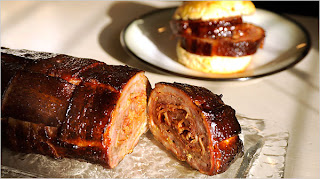Here in Waipa, the
Waikato Times is our local daily. I like it. It’s a strong regional paper, has good Pacific coverage (for example,
this obit of the Tongan novelist Epeli Hau’ofa) and it has Kingsley Field. Here he is hailing
the approach of autumn:
Already darkness is expanding its hold over dawn and dusk, and soon enough there will be a sharpness at daybreak, indicating frosts are on the way. And as that time creeps up, so there’s a group of men and women who begin to “sort out their stuff” checking on back-pack straps, overhauling camping and cooking gear, making sure shirt-buttons are sewn on tight, that woollen socks don’t have holes, that thermal underwear is in good condition. Sleeping bags will be aired, tents and pegs and cordage inspected, knives honed, boots greased, rifles oiled and cleaned and sighted in, ammunition purchased or special loads put carefully together.
Yes, hunting season approaches. Home Paddock writes occasionally about the urban-rural divide –
here, for example – and hunting is a real marker. A metrosexual friend in Auckland was horrified last year by the rise of Sarah Palin: it wasn’t her ignorance, religion or political views that upset him most: “It’s that gun shit I can’t stand,” he said. I didn’t like to tell him that my father-in-law goes duck-shooting in the Manawatu, my grandfather used to take me along to the Tauranga Rifle Club, both my neighbours go hunting (they eat a
lot of venison) and most of the dads at my children’s school have guns. All farmers do, all over New Zealand. It’s
normal.
As an attempt to bridge the urban-rural divide (and it’s a one-way bridge, since the incomprehension is almost totally on the urban side), Sunday 1 March is
Open Farm Day:
Farmers will take you for a walk around the farm, introduce you to the animals and explain how they grow crops. . . Every farm visit will be different. On some farms there will be games to play and activities like sheep shearing, milking cows and working-dog demonstrations. This is not a sanitised farm experience but an opportunity to see real farms and talk with real farmers.
Twenty-eight farms across the country will be open to the public.
This map shows the ones closest to you. It’s a great idea – see how the other half live and all that. My friend might even discover that farmers tend to be smart, well-informed and, sometimes, quite nice when you get to know them. Even if they do have guns.






